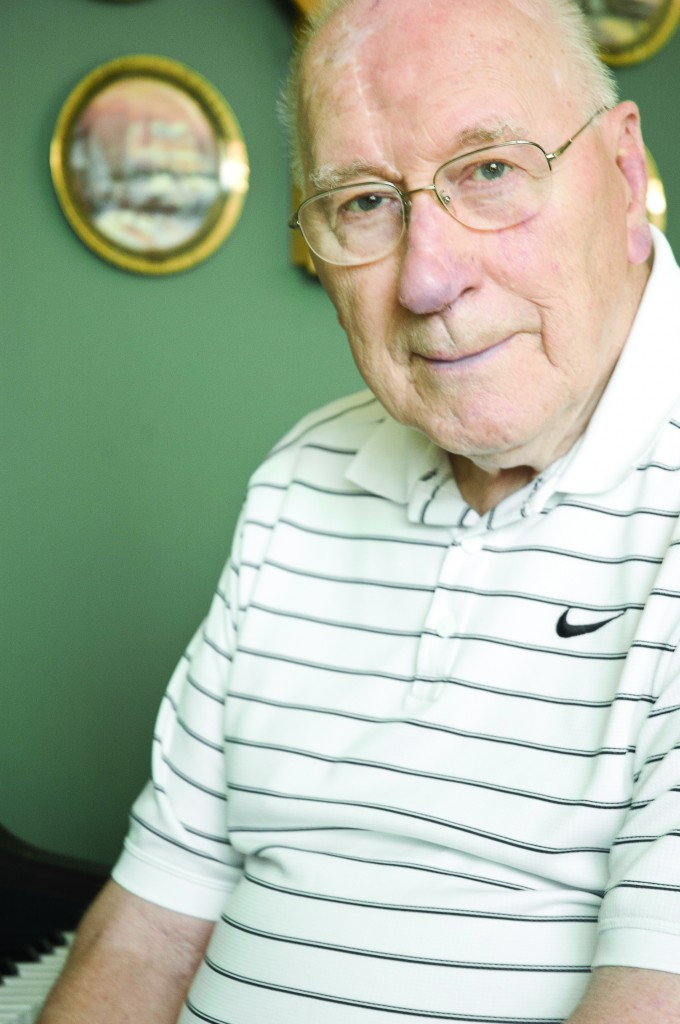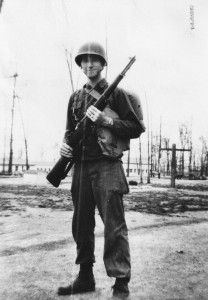SUN CITY – Dick Tanney may have never seen combat during his service with the Army, but he’s nevertheless proud of his past.
Tanney, who served as a replacement in the seventh infantry division of the 35th signal battalion, spent years trying to enlist – but kept getting turned away.

Sun City resident Dick Tanney was eager to serve in World War II and finally got the call to serve in Japan near the war’s end. Tanney completed an honor flight to Washington D.C. this May. (Chris La Pelusa/Sun Day Photo)
He, like many other Americans, wanted to join the Army shortly after the United States joined World War II, but there was just no need for additional soldiers – since the war was entering its final leg.
“It was a different story, World War II. If you weren’t in any of the services, people would stop you on the street and ask you why you weren’t enlisted. I don’t remember how many times I would get the 4-F (military code for “Registrant not acceptable for military service”), but I kept trying. I was waiting to get drafted, but they weren’t taking any enlistments. Whatever I had to do, I would’ve done my duty,” Tanney said.
When the call finally came, Tanney would find he was as¬signed as a replacement and would be sent to Okinawa for occupational duties.
“We knew [the war] was ending, but we didn’t know it would end as quickly as it did,” he said, adding his division was set to invade the southern Japanese islands until the United States dropped two atomic bombs on Japan. “Then it was over. Our mission was cancelled.”
Tanney’s division was reassigned to Korea to continue occupational duties, and he would stay there until the spring of 1946, when he was discharged from the Army.
One of their first missions? Occupy Seoul to prevent Russian forces from entering.
“That’s where the 38th parallel was established. The Russian Army was training the North Korean Army to invade the south. Once we got to Seoul, they didn’t put up a fight – they didn’t want to get involved with us,” Tanney said.
He adds that his division is also responsible for the formation of an early version of the Korean National Police – though it wasn’t a fighting outfit. Tanney said, “It should have been, but it wasn’t.”
Tanney received one medal for his service, awarding him for the attempted Japanese occupation, but that medal has since been lost. As have most of the documents affiliated with that time: “They kind of just got lost in the shuffle. I’ve lived in three different places since I returned home.”
However, the memory is still there. So much so that the Sun City resident recently completed an Honor Flight to our nation’s capital. While Tanney had read up on the flights and seen a couple of profiles on television, he really had no initiative to sign up – though it did interest him. It wasn’t until his grammar school buddy, who served in the air core during World War II, called him up and said he had signed the two of them up that the gears started turning.
“He said he wanted to go with me so he didn’t have to go alone,” Tanney said, chuckling.
And on May 14, that flight was achieved. Tanney flew out of Midway Airport and toured the memorials in Washington, D.C., stopping for the longest duration at the World War II monument.

A photograph of Dick Tanney in basic training before entering service for the Army in World War II. (Photo Provided)
“We were treated with a little bit of dignity. We formed ranks and the third division boys marched past us with the flags and saluted us. Of course there was the honorary wreath laying ceremony, and I was able to get my picture taken by the Illinois statue,” he said.
While he mingled with fellow veterans, discussions never went too far into specific combat duties.
“We really didn’t have too much time at these memorials, but I always had my one funny answer prepared. Some of these fellas [that I had gone with] had really been through a lot, had seen a lot of combat and whatnot,” he said. “When we’d talk about the kinds of things we saw, I mentioned I didn’t see com¬bat, but that I was still a hero. They would ask how, and I would reply that I shot our company cook, saving the lives of hundreds. That got a good laugh.”




